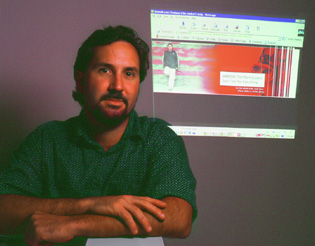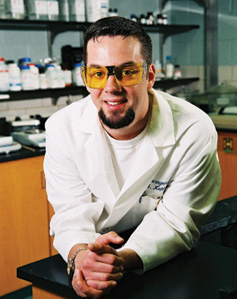

A publication of The Graduate School, University of North Carolina at Chapel Hill
On-Line Version Spring 2005
Home | Back issues | About us | The Graduate School | UNC-Chapel Hill | Make a gift
Making
an Impact:
Graduate student connect Carolina with communities
The relationship between graduate education and the people of North Carolina often is poorly understood outside the University community. Many people across the state have little idea about the important work being done by graduate students in Chapel Hill and how that work affects their everyday lives.
 |
| Royster Fellow Sarah Carr’s research about blue crab migration will help protect North Carolina’s most valuable commercial fishery. |
 |
| Royster Fellow James Thrasher studies new strategies to combat teen smoking. |
|
Photos
by Will Owens |
The Graduate School has set out to change that through innovative programs like the Graduate Student Ambassadors and Speakers Bureau and the Impact Awards. These programs are two sides of the same coin: One sends graduate students into communities across North Carolina to speak and present their research, and the other rewards students doing research of particular importance to the state’s citizens. Both emphasize the vital connection between the people of North Carolina and the research graduate students are doing at the state’s flagship public university.
Ambassadors for Graduate Education
Thomas S. and Caroline H. Royster Fellow Sarah Carr spends much of her time cruising the estuaries of coastal North Carolina, tracking the migration of spawning blue crabs and trying to figure out how to better manage this commercially valuable species.
The N.C. Division of Marine Fisheries reports that in 2003 crabbers harvested nearly 43 million pounds of blue crabs with a commercial value of more than $37 million. This makes blue crabs the most important fishery in the state, but its future is far from certain.
Carr, a fifth-year doctoral student in marine sciences, believes her research is crucial to the economy and heritage of coastal North Carolina. That’s why she decided to share her work with those in the crabbing industry and the public at large through the Graduate Student Ambassadors and Speakers Bureau.
The program, launched in spring 2004, is dedicated to sending students into communities across North Carolina to serve as ambassadors for graduate education. These students speak at libraries, schools and civic organizations to communicate to the public how graduate students’ research directly benefits the citizens of the state.
For Carr, the connection her work has to North Carolinians is clear. “Most of us have eaten and enjoyed crab cakes,” she said, “and my research is a small part of a large effort to make sure that there will be crab cakes in our future.”
But Carr’s research is about more than tasty delicacies. It is also of vital economic importance to the state. “The blue crab fishery is North Carolina’s most valuable fishery,” she said, “and fisheries managers need to have complete information on the life history of crabs in order to manage the fishery effectively.”
Carr is using ultrasonic telemetry to track the routes of female blue crabs as they migrate from estuaries to the ocean to spawn. Current protections for spawning crabs, such as spawning sanctuaries where harvesting is banned, do little to protect females as they migrate to and from spawning sites. This threatens the sustainability of the population, Carr said.
She wants to communicate her findings to fishery managers so they can more effectively manage the harvest and ensure that there will be crabs to harvest in the future. In this way, Carr’s work is not abstract but has a direct impact on the state and its economy.
But beyond this particular industry, Carr also hopes to serve as an ambassador for graduate education at Carolina as a whole.
“I think it is very important to tell members of the public about the types of research being done at their state universities,” she said, “and to keep people informed about how that research is helping the larger community.”
Another member of the Graduate Student Ambassadors and Speakers Bureau is Royster Fellow James Thrasher, who is in the fifth year of his Ph.D. in health behavior and health education. Thrasher is studying how anti-corporate sentiment among youths might be used to combat teen smoking.
“Tobacco use is the leading
cause of premature death and preventable illness in
North Carolina,” he said, “so it is important to support effective
smoking prevention campaigns.”
As he speaks to groups across this tobacco-producing state, Thrasher hopes to raise citizens’ awareness of the hazards of tobacco, particularly to teenagers.
“I want to sensitize groups to the global epidemic of tobacco use and our responsibility to stem the tide of tobacco-related death and disability,” he said.
Thrasher said that he participates in the program because he worries that the importance of his and other students’ work to North Carolinians is not well understood.
“Part of our responsibility to the citizens of North Carolina is to make sure that we understand one another,” he said. “The Ambassadors and Speakers Bureau is an important step toward helping others know what we are about and helping us know more about others in our community.”
The Graduate School focuses on community
Sandra Hoeflich, associate dean for interdisciplinary education, fellowships and communication, helped develop the Graduate Student Ambassadors and Speakers Bureau. She believes the program is crucial to The Graduate School’s mission of supporting graduate education.
“The purpose of the Ambassadors and Speakers Bureau is to educate the citizens of North Carolina regarding the significant work that is done by graduate students at Carolina,” she said. “We want them to know how much of the research students are doing benefits their communities directly.”
Citizens don’t always understand how the University impacts their lives and communities, and Hoeflich believes sending students into communities is one way to bridge that disconnect.
“Every time a graduate student goes out there and presents research to an audience,” Hoeflich said, “that audience learns what graduate students do and why it benefits North Carolina as a community.”
Rewarding service to North Carolina
 |
| Impact Award winner Brian Keppler is pioneering a new way to attack cancer cells. |
 |
| Impact Award winner Jennifer Craft Morgan seeks to improve job satisfaction and retention of nursing home workers in North Carolina. |
Photos
by Will Owens |
In addition to sharing graduate students’ work with citizens, The Graduate School also wants to reward students who are doing research of particular benefit to North Carolina. This is the purpose of the annual Impact Awards, launched as the Centennial Awards in 2003 and now supported by the Graduate Education Advancement Board. Many Impact Award winners go on to serve in the Graduate Student Ambassadors and Speakers Bureau.
Impact Award winner Brian Keppler, who also won a fellowship from the American Foundation for Pharmaceutical Education, is pioneering new cancer drugs that attack cancer cells by inhibiting an enzyme called telomerase. This research could lead to big breakthroughs in treatment because the drugs would be effective against most types of cancer rather than only specific types.
There were almost 40,000 new cancer cases and more than 16,000 deaths in North Carolina in 2003, and Keppler hopes his research can help change that.
“It’s rewarding to do something that actually helps people,” he says. “Cancer affects everybody in some way.”
This type of research also brings an economic benefit to North Carolina. “One of the key elements of this state’s economy is Research Triangle Park,” Keppler says. “Graduate education and student research is at the forefront of drug discovery, so that makes North Carolina a good place for biotech companies to do business.”
Keppler was pleased that The Graduate School recognized his contribution. “Winning the Impact Award was a big deal,” he says. “It’s important to reward work that affects people.”
Another Impact Award winner is Jennifer Craft Morgan, a sociology doctoral student who is working to reduce the extremely high turnover among nursing home workers in North Carolina.
“I hope my work will benefit the people of North Carolina by providing better care to the state’s older people,” she says. “Improving care workers’ job satisfaction through better support and pay will reduce turnover, which should lead to better care.”
Morgan thinks it is important to recognize student research that helps North Carolinians. “The Impact Awards suggest there is a priority at Carolina on helping your community,” she says. “This award tells people that it’s an important thing to do and is appreciated.
“The state supports graduate students and helps us do all this work, so it’s nice to be able to help the community that’s given so much to us.”
Graduate Board supports awards
Board members fund the Impact Awards out of their own pockets, a contribution that Hoeflich said is above the call of duty.
“This is a tremendously generous thing that they are doing,” she said. “They are personally funding these awards to recognize graduate students’ research and therefore encourage them to do research that’s really making a difference to our state.”
Board member Michael Harpold heads the committee that oversees the Impact Awards given each spring. He said the idea for the awards grew out of the success of the Centennial Awards, which were part of the Graduate School’s centennial celebration.
“We were excited about the buzz and the recognition the Centennial Awards generated,” Harpold said, “so we decided this is something we want to support going forward.”
Harpold sees the Impact Awards as both a chance to recognize students’ work and an opportunity to communicate with the public about the value of graduate education.
“The idea is to get students out there in front of people so they think, ‘Hey, everyone in Chapel Hill doesn’t just play basketball,’” he said. “We want people to understand that there is a lot going on in Chapel Hill that is actual work directed at real problems and real people in North Carolina.
“This goes back to the mission of the University when it was first founded in the state constitution: to provide a service to the citizens of North Carolina.”
Harpold and the rest of the Board believe that graduate education is taking on an increasingly significant role in the state’s economy.
“We need to let people know that graduate education is becoming more important every year as the general level of education rises,” he said. “One of the purposes of graduate education is to draw talented people to the state to work here and teach here.”
The Board hopes that by bringing attention to the valuable work Carolina graduate students do, legislators and taxpayers will be more willing to provide funding when it comes time to make tough budgetary decisions.
For The Graduate School and the Graduate Education Advancement Board, the Ambassadors and Speakers Bureau and the Impact Awards represent the beginning of a long-term strategy to build public awareness of the importance of graduate students’ research to the people of North Carolina.
“The goal is to establish greater communication between Carolina and the citizens of North Carolina,” Hoeflich said. “We want to learn what is needed, and we want them to learn how much we can offer.”
- Erik Holmes
© 2003, The Graduate School, The
University of North Carolina at Chapel Hill
All text and images are property of The Graduate School
at the University of North Carolina-Chapel Hill. Contact Sandra Hoeflich
at shoeflic@email.unc.edu
to request permission for reproduction.